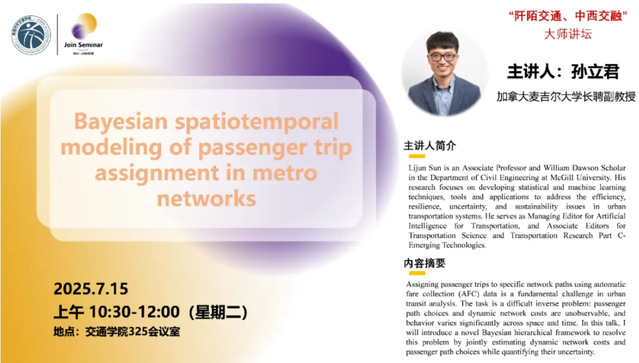
TIME & LOCATION
July 15, 2025, 10:30-12:00
Room 325, School of Transportation
TOPIC
Assigning passenger trips to specific network paths using automatic fare collection (AFC) data is a fundamental challenge in urban transit analysis. The task is a difficult inverse problem: passenger path choices and dynamic network costs are unobservable, and behavior varies significantly across space and time. In this talk, I will introduce a novel Bayesian hierarchical framework to resolve this problem by jointly estimating dynamic network costs and passenger path choices while quantifying their uncertainty. Our model decomposes trip travel time into four components---access, in-vehicle, transfer, and egress--each modeled as a time-varying random walk. To capture heterogeneous passenger behavior, we introduce a multinomial logit model with spatiotemporally varying coefficients. We manage the high dimensionality of these coefficients using kernelized tensor factorization with Gaussian process priors to effectively model complex spatiotemporal correlations. We develop a tailored and efficient Markov chain Monte Carlo (MCMC) algorithm for model inference. On a large-scale dataset from the Hong Kong Mass Transit Railway, our framework demonstrates superior predictive accuracy over established benchmarks. The results reveal significant spatiotemporal variations in passenger preferences and provide robust uncertainty quantification, offering transit operators a powerful tool for enhancing service planning and operational management.
ABOUT THE LECTURER

Lijun Sun is an Associate Professor and William Dawson Scholar in the Department of Civil Engineering at McGill University, Montreal (QC), Canada. He received his PhD degree in Civil Engineering (Transportation) from the National University of Singapore in 2015, and earned his Bachelor degree in Civil Engineering from Tsinghua University (Beijing, China) in 2011. His research focuses on developing statistical and machine learning techniques, tools and applications to address the efficiency, resilience, uncertainty, and sustainability issues in urban transportation systems. He is now leading the smart transportation lab at McGill and the current research program of the lab centers on modeling spatiotemporal urban mobility and traffic data, stochastic modeling of human driving behavior, probabilistic time series forecasting, Bayesian statistics, and tensor analysis. He serves as Managing Editor for Artificial Intelligence for Transportation, and Associate Editors for Transportation Science and Transportation Research Part C-Emerging Technologies.